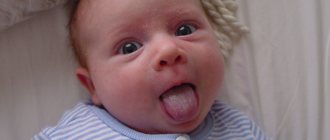For every child, the first trip to kindergarten is a huge stress, because from that moment the child is forced to take his first independent steps into adulthood. In kindergarten, a child joins society, learns to communicate with peers, live in a team, and learns how to behave in society. But not all children find it easy to integrate into new living conditions. Some kids are so uncomfortable that they express their negative feelings in the most unusual, somewhat cruel way. For example, a child begins to bite. Moreover, “biting” can only manifest itself when the baby visits kindergarten, but more often such behavior can be observed at home, but in the garden it reaches its “apogee.” But why does a child bite in kindergarten? What is the cause of this type of childhood aggression? How to solve the problem without harming the child's psyche?
Up to a year
At this age we are talking only about physiology. Babies begin to bite when teething. Swollen gums itch and hurt, and the baby tries to get rid of the pain by biting everything.
During this period, special “bumpy” silicone toys filled with gel are very effective. They can be given to your baby slightly chilled. An elastic, cool toy alleviates discomfort. If this does not help, your pediatrician may recommend special medications to relieve itching and pain.
It is very important to stop your baby from biting during feeding. Pediatricians advise stopping feeding immediately after a bite, strictly telling the baby that this should not be done. A grown-up child will perfectly grasp the intonation.
You can breastfeed again after 2-3 minutes, and if the bite recurs, increase the break. The child must learn that he deprives himself of milk by biting his mother.
Sometimes on forums there is advice to pinch the child a little in response to a bite. But psychologists do not recommend this method.
1-2 years
The physiological cause of involuntary bites can be weakness of the masticatory muscles.
They need to be trained - let the baby inflate balloons, chew carrots, blow soap bubbles. At this age, psychological reasons also appear.
Bites "on emotions"
Biting can be a way of expressing emotions. The baby simply does not yet know how to adequately express them; his vocabulary is limited.
The child hits his mother or bites, trying to attract attention to himself, relieve tension, throw out accumulated feelings - both good and bad. At the same time, he may not understand that it causes pain.
The baby needs to be taught to express emotions - to jump and clap his hands, hug, kiss.
At this age, when playing with a child, there is no need to playfully bite him. The baby repeats the actions of adults, but his strength may not calculate, and his bite will be painful.
Moreover, he will not understand why he is being scolded - after all, he did the same thing as adults.
Aggressive bites
It is important to give your baby enough attention. If mom is too busy, a bite can be a way to remind herself. Even though my mother was swearing, she was immediately distracted from her work, which means the method worked.
Aggression can be provoked by family troubles. If a child witnesses a showdown in a raised voice, he may bite the one he considers to be the culprit of the conflict.
Negative emotions are very harmful to the baby’s developing psyche, so all conflicts should be resolved in his absence.
What to do if a child bites
At this age, the child understands actions better than words. If he bites you, sternly tell him that you can't do that and move him away from you. Ignore him for 2-3 minutes. If there is one of the adults nearby, then let him take pity on you, showing the baby that you are in pain.
If a child bites in a children's group, you need to take him away from there, showing that no one will play with him while he behaves this way.
It is strictly forbidden to allow a child to achieve his goal in this way.
If he is trying to get a toy or anything else by biting, he needs to make it clear that this method will never work.
What will not help stop a child from pinching and why?
To stop a child from pinching, parents often use the following methods:
- explain that it hurts them and why they shouldn’t pinch;
- shout and swear;
- hurt in return;
- show resentment and ignore the child;
- they turn it into a joke and distract;
- punished.
I’ve come across situations where they used all the methods at once or tried them out in search of which one would “work.” As a result, the children began to pinch even more persistently, became even more disobedient and threw tantrums more often. The reasons for this behavior lie in the characteristics of development and perception at an early age.
Kids don't understand explanations. The child's brain is not able to perceive, process and analyze a large flow of information. In addition, at this age, cause-and-effect relationships are not yet available - young children do not understand the logic of actions. Therefore, the younger the child, the shorter and clearer phrases you should communicate with him - without moralizing or complex explanations.
They do not know how to put themselves in the place of another and feel their pain. Children feel only their pain and their emotions. Their nervous system is not yet mature for empathy, since the necessary parts of the brain begin to work only by the age of 4–4.5 years.
This does not mean that a mother should remain silent about her feelings. You can and should say that it is painful and unpleasant. This will set boundaries and introduce the child to other people's reactions to his behavior. But you shouldn’t expect that he is able to empathize with someone else’s pain and feelings.
Very demanding of order. We are talking not only about order in things, but also in the actions of an adult. When parents behave inconsistently and give completely different reactions to the same behavior, the child becomes even more confused and loses his bearings. It is impossible to learn a rule when it is different every day.
Why do kids love order and predictability so much?
They absorb our behavior without judgment. Small children do not divide our actions into good and bad, since they do not have enough experience to evaluate them. They only explore and imitate us. Therefore, if we pinch in response, then we teach - it’s possible to do this.
They need support, not punishment. When we lose control, the child feels in danger. The main person in his life suddenly pinches him, screams or punishes him. For a child, this is precisely “suddenly” - after all, he cannot follow adult logic and connect his action with ours. He experiences this as an unfair and offensive attack.
Punishments do not work and greatly spoil the relationship with the baby. How can you trust someone who punishes you for expressing your feelings? Only an accepting, understanding and calm adult nearby can help.
2-3 years
With age, the child's awareness of actions increases. The child understands that he is causing pain with his bite. As a rule, there is some kind of psychological reason - quarrels in the family, conflict with children in kindergarten, or other stress.
The baby’s vocabulary is still not enough for him to describe his condition in detail. Therefore, you should observe him and analyze the situation around him.
Aggression, which also manifests itself through bites, can be caused by the birth of a younger brother or sister. For a small child, it can be a difficult experience for parents to switch their attention to the baby.
What to do
A child growing up in an atmosphere of psychological comfort is much less prone to aggression. Therefore, a calm, friendly atmosphere in the family is very important.
To release negative emotions, psychologists recommend introducing replacement actions. If you see that your child is upset, invite him to kick a ball with all his heart, run (you can race), or ride on a swing. Regular morning exercises help a lot.
If a family is expecting the birth of a baby, the older child needs to be prepared in advance. You can explain to him that he is loved no less, but a newborn requires more care, since he is very small.
It is necessary to involve the older child in care; he may well bring a diaper or lift the pacifier. And everything must be done so that he does not feel forgotten.
3-4 years
The crisis of three years of age begins to manifest itself. It is important for a child to defend his opinion, to feel like a leader, and if this fails, aggressive methods can be used - throwing toys, hitting, biting.
At this age, many children go to kindergarten, and this is a serious burden for the unstable child’s psyche. Bites can serve as a means of protection, a response to grievances, or a way to relieve stress.
What to do
At this age, you need to teach your child to express his emotions, explain them - “I was offended,” “I’m hurt,” “I was scared.” By speaking and realizing emotions, he will be able to get rid of tension, and parents will be able to understand how the baby is feeling.
You can play up the situation with toys, or write a fairy tale about how the animals learned to get along without biting.
Playing sports will help relieve stress - long active walks, exercise, swimming, roller skating, football.
Child psychologists advise teaching a child of this age to ask for forgiveness for the pain caused.
Other causes of aggression
If a child over three years of age cannot break the aggressive habit of biting, the reason for this behavior may be much more serious than temporary stress. Perhaps the child is growing up in an unfavorable environment, hence pedagogical neglect, developmental delays, inability to control emotions, low communication and speech skills.
The reason may be physiological if there are problems with neurology: consequences of brain injuries, headaches, fears, imbalance.
In such cases, the help of a pediatrician and child psychologist is necessary.
4-5 years
If the habit of biting persists at this age, the reason is most likely mental disorders. The child understands perfectly well that he hurts others.
There is no point in hoping that he will outgrow this habit; it is better to immediately turn to specialists. Perhaps the child has other developmental pathologies, and later his behavior may become uncontrollable.
One of the reasons for this behavior may be hyperactivity or attention deficit disorder, but only a specialist can accurately determine this. Therefore, parents need to seek advice from a pediatrician, child psychologist, or neurologist as early as possible.
When is specialist help needed?
If your baby only bites from time to time, then there is nothing to worry about. In most cases, this problem resolves itself, but in some cases it is recommended to consult a specialist:
- The child uses his teeth constantly, regardless of his mood.
- The problem remains relevant after the child is three years old.
- Bites hard, hurts and injures other children.
- This is how he shows his aggression, this is how he defends his opinion.
Typically, children begin to bite others between the ages of one and three years; it is during this period that the child first becomes aware of himself as a separate person. According to psychologists, a “biting” baby is a completely normal phenomenon, this is how a small person declares his rights. But experts remind that after three years, children should already be able to express their thoughts and emotions in words, so by this age, parents usually manage to wean their child from a bad habit.
Dear readers, does your child bite? Or maybe you have already managed to wean him from this activity?
Preparing for kindergarten
First of all, you need to do everything so that the need to attend kindergarten does not become stressful for the child. Prepare him for kindergarten in advance, tell him how much fun he will play with other children, how many new toys there will be.
Teach your baby to play with other children by bringing him to playgrounds. At the same time, you need to carefully monitor your child and stop any attempt to bite.
Psychologists advise placing a physical barrier in front of the mouth open to a bite, for example, an open palm, and strictly prohibiting biting.
If this does not help, the child should be taken away from the playground, explaining that this is a punishment. This way, the child will understand that trying to bite will deprive him of the opportunity to play with other children.
It is necessary to explain that he can hurt someone else. Remind, for example, how it hurt him when he fell, how he cried after that.
How should the parents of the “victim” behave?
It is strictly forbidden to encourage a physical response. Advice to go fight back or bite back will only reinforce negative behaviors. What to do? Explain that the child who bit or hit did the wrong thing, that he simply doesn’t know how to behave yet, but will definitely learn.
Summarizing all of the above, Tatyana Valerievna listed the main mistakes of elders who want to correct the situation, but do not know how to do it correctly:
- "An eye for an eye a tooth for a tooth". This tactic may work in a wolf pack, but it is certainly unacceptable in relation to a small child. Even the most harmless, at first glance, spanking does not teach a child anything, but on the contrary, it shows him that it is possible to use force. Our children are a reflection of ourselves. Remember once and for all that you should not behave in a way that you would not want your son or daughter to behave.
- Pretense. There is no need to pretend that you are crying with burning tears. This doesn't work for many children. They quickly realize what’s what, and begin to perceive what is happening as an interesting performance, which, in essence, it is. This way you will only achieve that the child will continue to behave badly in order to, so to speak, call the actress for an encore.
- Attempts to appeal to conscience. Mom’s exclamations “Shame on you!” will not lead to anything, because the child is simply not familiar with this feeling yet.
pixabay.com/
What to do if a child bites in kindergarten
If the teacher reported that your baby bites, find out the situation in as much detail as possible: does he bite everyone in a row, or just one person, what preceded the bite, and so on. If the child has not shown aggression before, then perhaps this is his reaction to a new environment, or this is how he responded to an attempt to offend him.
At home, discuss the situation in detail with your child, explain that you should have done something differently. You can play around with this - for example, a bear is playing with a ball, and the bunny also wants to play. But he will not take the ball away and bite, but will simply wait until the bear has had enough of playing.
In these cases, the help of educators is necessary. Perhaps the baby needs to pay more attention during adaptation. Sometimes teachers place bullies separately, but this does not always help; in some children this can cause hysterics and only worsen the situation.
Agree in advance with teachers on how to react if a child bites in kindergarten. You may need advice from a psychologist who works in a kindergarten and has probably encountered similar situations.
How to eradicate a bad habit
- The main thing is to stop such tricks and punish in moderation for incorrect behavior. Soon the child will stop showing aggression in this way.
- Assess the emotional situation in the family. Psychologists say that in families where scandals and high-pitched showdowns reign, most often the younger ones become unbalanced and aggressive. Eliminate all conflict situations and see how your baby’s behavior changes.
- The problem with many parents is that they don't pay enough attention. Try to devote as much time as possible to him, find out how his day went, what he did and what he learned.
- Be sure to praise for new achievements, hug and give your warmth. Tactile sensations are important for establishing a connection between baby and mother. During kissing, the hormone “oxytocin” is produced; it is responsible for affection between people. A caressed and loved baby simply has no reason to bite.
What not to do
Psychologists categorically do not approve of slaps on the lips, retaliatory biting and pinching, and in general any corporal punishment from parents. This will not help solve the problem, but may perpetuate aggressive behavior.
A stern, condemning tone is in itself a severe punishment for a child. But you also need to scold a child at home; it is better not to do this in front of strangers.
A little rebel can perceive this as humiliation and protest in accessible ways.











